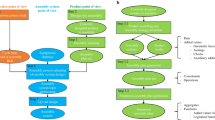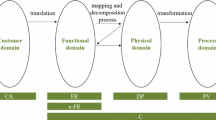Abstract
Increasing demands for lower cost of goods, due to international competition, has developed a new area of rationalization for increased productivity which can be achieved by applying new radical methods of production principles. Design for Assembly (DFA) is one of such methods that should be considered in the early design stage in order to cope with the increasing demands of lower cost, improved working environment, and higher wages. When Axiomatic Design (AD) is implemented with DFA in an intelligent way, a new area of design concepts would be realized. This study examines some elements of intelligent design systems to assess manufacturability of a product through the development of a knowledge based expert system for assembly (KBESA). The knowledge base has been acquired from DFA along with AD concepts with emphasis on the conceptual design stage where the structure of the product as a whole is considered. These concepts have been implemented in a case study illustrating its applicability.
Similar content being viewed by others
References
Funk, J.L., Design for assembly of electrical products,ASME J. Manufacturing Rev. 2(1) (1989), 53–60.
Suh, N.P.,The Principles of Design, Oxford University Press, 1990.
Boothroyd, G. and Dewhurst, P.,Product Design for Assembly Handbook, Boothroyd-Dewhurst, Warfield, RI., 1987.
Jackson, P.,Introduction to Expert Systems, Addison-Wesley, Reading, Mass., 1986.
Winston, P.H.,Artificial Intelligence, 2nd edn, Addison-Wesley, Reading, Mass., 1984.
Bielawski, L. and Lewand, R.,Expert Systems Development — Building PC-based Applications, QED Information Sciences Inc., 1988.
Merrit, D.,Building Expert Systems in Prolog, Springer-Verlag, New York, 1989.
Turbo Prolog User's Manual, Borland International Inc., 1989.
Turbo Prolog Reference Manual, Borland International Inc., 1989.
Kroll, E. and Lenz, E., A knowledge based solution to the design for assembly problem,ASME J. Manufacturing Rev. 1(2) (1988), 104–108.
Billatos, S.B., Guidlines for productivity and manufacturability strategy,ASME J. Manufacturing Rev. 1(3) (1988), 164–167.
Jakiela, M., Intelligent suggestive CAD systems, research overview, LMP-MIT, 1989.
Andreasen, M., Kahler, S., and Lund, T.,Design for Assembly, IFS Ltd. and Springer-Verlag, New York, 1983.
Rathmill, K.,Robotic Assembly, IFS Ltd. and Springer-Verlag, New York, 1985.
Asfahl, C.R.,Robots and Manufacturing Automation, Wiley, New York, 1985.
Author information
Authors and Affiliations
Rights and permissions
About this article
Cite this article
Jung, J.Y., Billatos, S.B. An expert system for assembly based on Axiomatic Design principles. J Intell Robot Syst 8, 245–265 (1993). https://doi.org/10.1007/BF01257997
Received:
Accepted:
Issue Date:
DOI: https://doi.org/10.1007/BF01257997




